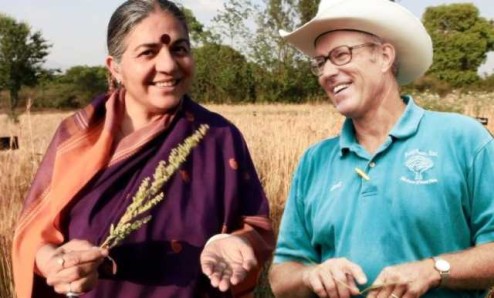Earlier this year I had the great privilege and honour of having lunch with quantum physicist turned environmental activist and feminist Dr Vandana Shiva. Dr Shiva won the Sydney Peace Prize in 2010, and was returning to Sydney as part of an Australian-New Zealand tour warning about the long-term consequences of globalised farming methods.
I attempted to get an article published about some of the things that I learned. After many drafts, three submissions and one rejection (the other two never replied), I have decided rather than leave it on my hard-drive unread, I will share it with you here…
Farming practices as a national security threat
Quantum physicist turned environmental activist and feminist Dr Vandana Shiva has a lot to say about national security—and it’s not about spies and intelligence. The real threat is food security.

Dr Vandana Shiva and American farmer Joel Salatin, who did the introduction to “Planet on Plate: eating and farming for our future”
Late last month, Shiva spoke to a sell-out Sydney audience as part of an Australian-New Zealand tour warning about the long-term consequences of globalised farming methods.
In her Sydney presentation and in several books – such as Soil Not Oil and Making Peace With the Earth – Shiva argues that the ways that foods are farmed, delivered and consumed have a direct impact on human health and planetary wellbeing.
One Indian farmer commits suicide every thirty minutes. In the last twenty years, over 290,000 have ended their lives.
Traditional farming methods prioritised biodiversity, nurturing microorganisms in the top layer of soil that are essential to producing nutritious crops. With globalising modern farming methods, says Shiva, topsoil and microorganisms are disappearing.
Modern farming methods are designed to deliver cash crops. This means that one form of crop is planted year after year on the same land, for sale on the global market. Such practice is destructive of land and lives. There is nothing “efficient” about it.
Such supposed modern farming requires more water and chemical fertilizers. Yet, according to Shiva, modern farming produces lower yields, lower health and lower wealth per acre than traditional farming.
The more deficient the soil, the more deficient the crops, and the more difficult the lives of farmers. The less diversity of food produced for local populations, the more poverty, the faster the population growth, and the cycle of poverty continues. Less supply and more demand means prices will rise on the global market, for less nutritious food.
Lurking behind modern farming are powerful corporations, who patent seeds and sell them to farmers for single-use. Shiva stresses that if seeds continue to be privatised, patented by corporations and sold to farmers for single-use, more and more farmers will be driven to suicide. Introducing genetically modified organisms (GMO) into the food chain produces further destruction.
The ethics and implications of modifying seed DNA are debatable. Some consider them “Frankenstein monsters,” and others plead they will address world hunger. To be sure there is no consensus.
The concern, for Shiva, is the powerful corporations that destroy traditional farming are also preventing information about GMO from reaching the headlines.
“They have so much power, it takes nothing for them to silence us. Even scientific publications in top peer-reviewed academic journals have been recalled thanks to their power,” Shiva shrugs.
“Experiments have connected GM maize to health problems, including to chronic kidney deficiencies, liver problems, tumours and earlier deaths,” Shiva explains.
GM foods clearly require more testing before they are sold, but it’s too late for that: unlabelled genetically modified oils, meats (animals fed GM feed) and other foods are already on Australian shelves.
At the end of Shiva’s Sydney presentation, a young student of public health at Sydney University spoke about the death of her father, a farmer in Uganda. Prior to his passing, he said to her: “Daughter, all the old men are dying because of the foods they are forcing us to grow. If we try to grow the foods that we know are good for us, they send in all these young men and they just uproot them from our gardens.”
Due to a lack of training in how to handle toxic agricultural chemicals and hybrid seed varieties, many farmers in Uganda are dying. Thanks to the lower crop yields that result from these patented seeds, many people in her village are hungry.
As climate instability worsens, the gap between rich and poor widens, soil quality declines and more species become extinct, what can be done?
Instead of globalising production, Dr Shiva calls for localisation: bringing back biodiversity instead of cash crops.
Local responses in Australia could include buying foods from local markets, or supporting corner stores rather than supermarket giants. Starting a conversation about seed patenting and GMO, encouraging the organization you work for to put people before their profits, and choosing ethical superannuation funds.
Make your interests known: if governments and corporations realise that voters and consumers care about their health and planetary wellbeing, perhaps they will take the issues of food, energy and climate more seriously.
If the Australian government wants to do more for national security, they could read the Sydney Peace Prize laureate’s Making Peace with the Earth and look for ways of protecting the interests of all Australians.
No Comments Yet